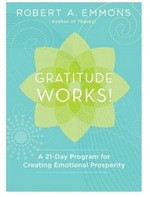For more than a decade, I have devoted my career to the study of gratitude. My research, and research by my colleagues, has linked gratitude to a host of psychological, physical, and social benefits: stronger immune systems, lower blood pressure, more feelings of joy, and a greater sense of social connection, among many others.
 The GGSC's coverage of gratitude is sponsored by the John Templeton Foundation as part of our Expanding Gratitude project.
The GGSC's coverage of gratitude is sponsored by the John Templeton Foundation as part of our Expanding Gratitude project.
Even armed with years of scientific data, making the case for gratitude can still be an uphill battle. At times I’ve been confronted with objections, reservations, or flat out hostility to the idea that gratitude is a virtue, or that we should devote more energy to cultivating an attitude of gratitude.
While I appreciate the questions and concerns people have about gratitude, I think many of the objections are based on fundamental myths or misconceptions about what gratitude really is. And unfortunately, these misconceptions deter people from practicing gratitude—and reaping its many rewards.
Here’s my take on five of the most pervasive myths about gratitude.
1. Gratitude leads to complacency
I’ve often heard the claim that if you’re grateful, you’re not going to be motivated to challenge the status quo or improve your lot in life. You’ll just be satisfied, complacent, lazy and lethargic, perhaps passively resigned to an injustice or bad situation. You’ll give up trying to change something.
In fact, studies suggest that the opposite is true: Gratitude not only doesn’t lead to complacency, it drives a sense of purpose and a desire to do more.
My colleagues and I have found that people are actually more successful at reaching their goals when they consciously practice gratitude. When we ask people to identify six personal goals on which they want to work over the next 10 weeks—these could be academic, spiritual, social, or health-related goals, like losing weight—we find that study participants randomly assigned to keep a gratitude journal, recording five things for which they’re grateful once a week, exert more effort toward those goals than participants who aren’t made to practice gratitude. In fact, the grateful group makes 20 percent more progress toward their goals than the non-grateful group—but they don’t stop there. They report still continuing to strive harder toward their goals.

This finding does not surprise me because people made to keep a gratitude journal in my studies consistently report feeling more energetic, alive, awake, and alert. Yet they don’t report feeling more satisfied with their progress toward their goals than other people do. They don’t become complacent or satisfied to the point that they stop making an effort.
This relates to other research showing that gratitude inspires “pro-social” behavior such as generosity, compassion, and charitable giving—none of which suggests passivity or resignation. Instead, it suggests that gratitude motivates people to go out and do things for others—to give back, I think, some of the goodness that they recognize receiving themselves.
In fact, my colleagues and I published a study in Motivation and Emotion a few years ago which found that kids who were more grateful than their peers at age 10 were by age 14 performing more pro-social activities and feeling greater social integration, meaning that they wanted to give back to their community and family. Again, the grateful people didn’t show passive resignation; they were out in the world doing stuff to make life better for others.
All this evidence supports an observation made by William Damon, the noted developmental psychologist, in his book The Path to Purpose, which is about how we can help kids find their calling in life. “The sense of gratitude for being able to partake in what the world has to offer, and to have a chance to make one’s own contribution,” writes Damon, “is common in those with a sense of purpose.”
2. Gratitude is just a naïve form of positive thinking
Some people claim that gratitude is just about thinking nice thoughts and expecting good things—and ignores the negativity, pain, and suffering in life.
Well, evidence shows it’s much more than that. Based on my research, I’ve come to define gratitude as a specific way of thinking about receiving a benefit and giving credit to others beside oneself for that benefit. In fact, gratitude can be very difficult because it requires that you recognize your dependence on others, and that’s not always positive. You have to humble yourself, in the sense that you have to become a good receiver of others’ support and generosity. That can be very hard—most people are better givers than receivers.
What’s more, feelings of gratitude can sometimes stir up related feelings of indebtedness and obligation, which doesn’t sound like positive thinking at all. If I am grateful for something you provided to me, I have to take care of that thing—I might even have to reciprocate at some appropriate time in the future. That type of indebtedness or obligation can be perceived very negatively—it can cause people real discomfort.
The data bear this out: When people are grateful, they aren’t necessarily free of negative emotions—we don’t find that they necessarily have less anxiety or less tension or less unhappiness. Practicing gratitude magnifies positive feelings more than it reduces negative feelings. If it was just positive thinking, or just a form of denial, you’d experience no negative thoughts or feelings when you’re keeping a gratitude journal, for instance. But, in fact, people do.
So gratitude isn’t just a nice, warm, fuzzy feeling. It has responsibilities that go along with it that can make it difficult or challenging for people under certain circumstances.
3. Gratitude makes us too self-effacing
Some people assume that if I am grateful, I give credit to others for my own success. When I recognize the ways others have helped me, I risk overlooking my own hard work or natural abilities.
Research suggests that’s not the case. In one study, researchers administered a purportedly difficult test and told the study participants that they could win money for doing well on the test. Then the participants received a helpful hint that would help them get a high score.
All the participants regarded the hint as helpful. But only those who felt personally responsible for their own score felt grateful for the hint. Gratitude was actually associated with a greater sense of personal control over one’s success.
We have corroborated this in other studies: Grateful people give credit to others, but not at the expense of acknowledging their own responsibility for their success. They take credit, too. It’s not either/or—either I did this all myself or somebody else did it for me. Instead, they recognize their own feats and abilities while also feeling gratitude toward the people—parents, teachers—who helped them along the way.
4. Gratitude isn’t possible—or appropriate—in the midst of adversity or suffering
Some argue that it’s impossible to be grateful in the midst of suffering. When life is going well, when there’s abundance—sure, then we can be grateful. But what about when we’re facing hard times?
I believe not only is gratitude possible in those circumstances—it’s vital to helping us get through them. When faced with adversity, gratitude helps us see the big picture and not feel overwhelmed by the setbacks we’re facing in the moment. And as I’ve suggested above, that attitude of gratitude can actually motivate us to tackle the challenges before us. Without a doubt, it can be hard to take this grateful perspective, but research suggests it is possible, and it is worth it.
Consider a study led by my colleague Philip Watkins, published in the Journal of Positive Psychology, in which participants were asked to recall an unpleasant, unresolved memory—a time they were victimized or betrayed or hurt in some way that still made them upset. The participants were randomly assigned to complete one of three different writing exercises, one of which involved focusing on positive aspects of the upsetting experience and considering how it might now make them feel grateful.
The results showed that the gratitude group reported feeling more closure and less unpleasant emotions than participants who didn’t write about their experience from a grateful perspective. The grateful writers weren’t told to deny or ignore the negative aspects of their memory. Yet they seemed more resilient in the face of those troubles.
 Robert Emmons is the author of Gratitude Works!: A 21-Day Program for Creating Emotional Prosperity
Robert Emmons is the author of Gratitude Works!: A 21-Day Program for Creating Emotional Prosperity
Similarly, roughly a decade ago, I asked people suffering from severe neuromuscular disorders to keep a gratitude journal over two weeks. Given that much of their lives involved intense discomfort and visits to pain clinics, I wondered whether they’d be able to find anything to be grateful for. Yet not only did they find reasons to be grateful, but they also experienced significantly more positive emotions than a similar group that didn’t keep a gratitude journal. The gratitude group also felt more optimistic about the upcoming week, felt more connected to others (even though many of them lived alone), and reported getting more sleep each night—an important indicator of overall health and well-being.
So again, this is a gratitude myth that can be debunked. Science suggests we can cultivate or maintain an attitude of gratitude through hard times, and that we’ll be better for it.
5. You have to be religious to be grateful
This myth is easy to bust: The new science of gratitude has clearly shown that people can have a grateful disposition even if they’re not religious. What’s more, it’s possible to boost levels of gratitude in people regardless of whether they’re religious. While some research suggests that religious people might be more inclined to feel or practice gratitude, they are by no means the only ones who score high on gratitude scales.
And among religious people, feeling grateful to God isn’t mutually exclusive with feeling grateful to other potential sources of goodness. In some of my research, we’ve asked people to identify the sources of their success and positive qualities, like their intelligence or attractiveness. People who score high in gratitude are more likely to give credit to God than are people who score low in gratitude. But those grateful people are more likely to give credit across the board, meaning that they also give credit to other sources, such as other people, genetics, and hard work.
I believe many of these myths spring from a fundamental misconception about gratitude: that it is a simplistic emotion. But part of what has kept me interested in gratitude for roughly 15 years is that it is deceptively complicated; each year I seem to encounter another nuance or layer to it. Once we appreciate these complexities of gratitude, documented by years of scientific research, we are in a better position to enjoy all the strengths and goodness it can bring.








Comments